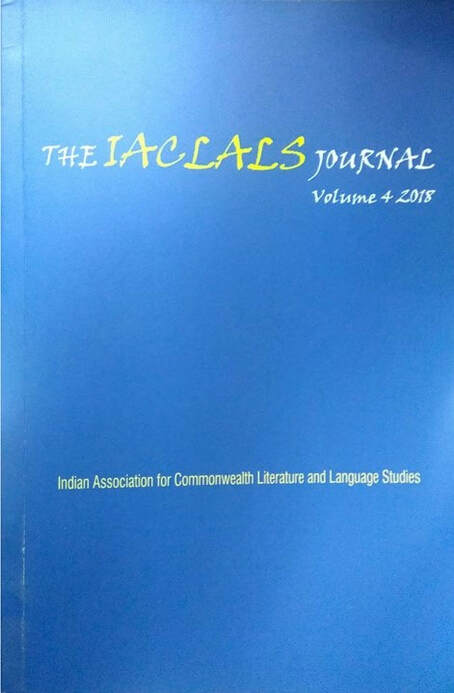THE IACLALS JOURNAL, VOLUME 4, 2018

Editorial
M. Asaduddin and Swati Pal
vii
Crips at a Crossroad: Laying Out a Counter-hegemonic
Agenda for Disability Studies in India
Someshwar Sati
1
Writing from, of and by the Northeast: Locating the
Northeast in the Novels of Mamang Dai, Siddhartha Deb and Anjum Hasan
Albeena Shakil
11
Identity Politics and the Burden of Dis-identification: How the Amar Chitra Katha Comic Series Features Stories from the Northeastern States of India
Layla Mascarenhas
21
Fantasizing History: I. Allan Sealy’s The Trotter-Namaas a Mythology
Ritwick Bhattacharjee
30
Houses and Maps as Boundaries of Home and (Home)land in Ashuli Kaisa’s Blogs
Natasa Thoudam
38
Performing Protests: Women and Performance in Manipur
Shweta Rao Garg
64
Dissenting Bodies: A Performative Reading of the Kangla Protest
Payel Ghosh
71
Stories from These Hills Called Home: (Re)-Constructing Identity through History and Memory
Deblina Hazra
81
Embodiment and Agency in Heisnam Kanhailal’s ‘Draupadi’ and Naked Protest at Kangla Fort in Manipur
Mukul Chaturvedi
89
A Story of the Land, People and Identity: Pora Gaonot Pohila Bohag
Jabeen Yasmeen
97
Subversion of Private and Public Discourses through Gender and Alternate Sexuality in Karan Johar’s
Ajeeb Dastan Hai Yehand Zoya Akhtar’s Sheila Ki Jawani
Nilanjan Chakraborty
105
Colonial Tea Garden Bungalows- Creating Identity and a Sense of Place in the Tea Districts of Assam
Madhuri Saikia
113
Not Khasi, Not Dkhar: Reading Anjum Hasan’s Lunatic In My Head and Neti, Neti: Not This, Not This
Sania Iqbal Hashmi
127
‘Enter(ing) into History as History’: (En)gendering the Translation of Adivasi Identity in
Nirmala Putul’s Beghar Sapne
Srinjoyee Dutta
135
The Divine and the Mundane: Ritual Sacrifice, Blood and the Feminine Principle in Indira Goswami’s
Under the Shadow of Kamakhya and The Man from Chinnamasta
Vibha S. Chauhan
143
Translating Marginality: The Echoes of the Subaltern in Hirma ki Amar Kahaani
Sarah Mariam
152
Reading Resistance in Temsula Ao’s ‘Apolitical’ Narratives on Naga Insurgency
Prajna Paramita Ray
159
“All the Rest is Myth and Mystery”: A Conversation with Mamang Dai
Rajashree Bargohain
167
When the Elephant is Talking: Trials, Hunting and Intersectionality in Tarquin Hall’s To the Elephant Graveyard
Sagar Taranga Mandal
176
Contemporary Literary Practices and their Specificities in Mizo and Naga Writing in English: Malsawmi
Jacob’sZorami and Easterine Kire’sBitter Wormwood
Bhumika R
184
Book Reviews
193
Bio-Notes
198
M. Asaduddin and Swati Pal
vii
Crips at a Crossroad: Laying Out a Counter-hegemonic
Agenda for Disability Studies in India
Someshwar Sati
1
Writing from, of and by the Northeast: Locating the
Northeast in the Novels of Mamang Dai, Siddhartha Deb and Anjum Hasan
Albeena Shakil
11
Identity Politics and the Burden of Dis-identification: How the Amar Chitra Katha Comic Series Features Stories from the Northeastern States of India
Layla Mascarenhas
21
Fantasizing History: I. Allan Sealy’s The Trotter-Namaas a Mythology
Ritwick Bhattacharjee
30
Houses and Maps as Boundaries of Home and (Home)land in Ashuli Kaisa’s Blogs
Natasa Thoudam
38
Performing Protests: Women and Performance in Manipur
Shweta Rao Garg
64
Dissenting Bodies: A Performative Reading of the Kangla Protest
Payel Ghosh
71
Stories from These Hills Called Home: (Re)-Constructing Identity through History and Memory
Deblina Hazra
81
Embodiment and Agency in Heisnam Kanhailal’s ‘Draupadi’ and Naked Protest at Kangla Fort in Manipur
Mukul Chaturvedi
89
A Story of the Land, People and Identity: Pora Gaonot Pohila Bohag
Jabeen Yasmeen
97
Subversion of Private and Public Discourses through Gender and Alternate Sexuality in Karan Johar’s
Ajeeb Dastan Hai Yehand Zoya Akhtar’s Sheila Ki Jawani
Nilanjan Chakraborty
105
Colonial Tea Garden Bungalows- Creating Identity and a Sense of Place in the Tea Districts of Assam
Madhuri Saikia
113
Not Khasi, Not Dkhar: Reading Anjum Hasan’s Lunatic In My Head and Neti, Neti: Not This, Not This
Sania Iqbal Hashmi
127
‘Enter(ing) into History as History’: (En)gendering the Translation of Adivasi Identity in
Nirmala Putul’s Beghar Sapne
Srinjoyee Dutta
135
The Divine and the Mundane: Ritual Sacrifice, Blood and the Feminine Principle in Indira Goswami’s
Under the Shadow of Kamakhya and The Man from Chinnamasta
Vibha S. Chauhan
143
Translating Marginality: The Echoes of the Subaltern in Hirma ki Amar Kahaani
Sarah Mariam
152
Reading Resistance in Temsula Ao’s ‘Apolitical’ Narratives on Naga Insurgency
Prajna Paramita Ray
159
“All the Rest is Myth and Mystery”: A Conversation with Mamang Dai
Rajashree Bargohain
167
When the Elephant is Talking: Trials, Hunting and Intersectionality in Tarquin Hall’s To the Elephant Graveyard
Sagar Taranga Mandal
176
Contemporary Literary Practices and their Specificities in Mizo and Naga Writing in English: Malsawmi
Jacob’sZorami and Easterine Kire’sBitter Wormwood
Bhumika R
184
Book Reviews
193
Bio-Notes
198
